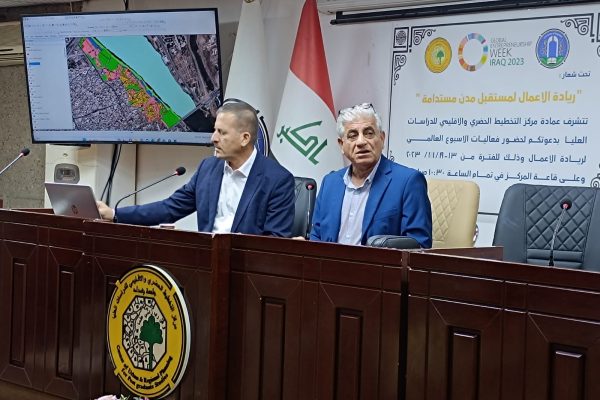Center of Urban and Regional Planning for Postgraduate Studies at the University of Baghdad presented a workshop entitled (The Journey of Innovation and Leadership in Developing Our Cities…The City of Mosul and Ur as a Model) on the occasion of Global Entrepreneurship Week, in the presence of the Center’s professors and employees and postgraduate students.
The workshop aimed to present a planning vision for local projects that adopted transformation and renewal in Iraqi cities through leadership and sustainable development. The Assistant Dean of the Center, Professor Dr. Mohib Kamel Falih, and the member of the advisory office, Dr. Falah Mahdi Hadi, presented the projects implemented by the office, based on the Ur tourist city project and commissioned by the General Secretariat of the Council of Ministers. The project was presented with a video film, documenting the achievements of the Center’s ideas and visions in the city of Ur and transforming it into an archaeological tourist city with an area of 1 square kilometre, which includes religious buildings, cultural centers and arcades. The city is surrounded by a green belt, with a church in the middle, being a religious tourist city, in addition to creating a place for documenting antiquities and a modern hologram platform, and thus the designs embodied a pioneering archaeological tourism project that reflects the Mesopotamian civilization and links it to tourism and antiquities.
A detailed explanation was also given at the workshop about the second project adopted by the center’s consulting office, which was the design of the old city in Mosul, which had an approximate area of 3 square kilometers. The project adopted urban renewal for residential uses of the land and transformed it into a river promenade while rebuilding the old and damaged residential units therein. According to a modern style in the spirit of Mosul folklore. The designs included commercial investment areas, parks, and water activities, as well as the restoration of the ancient archaeological wall after the reconstruction of the alleys of a city that is more than 1,400 years old, despite the challenges of soil examinations, its type, and the accumulated ancient layers, provided that life and services are restored to the city extending along its length. The Corniche, 1200 meters long, after submitting an economic and social feasibility study, the ownership limits of 273 house, shop and other designs were established.
The workshop produced a study that emphasized the importance of marketing ideas and offering expertise to all institutions, to create job opportunities and achieve leadership through scientific and practical integration.
